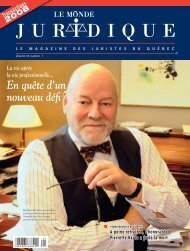Version PDF - Le Réseau juridique du Québec
Version PDF - Le Réseau juridique du Québec
Version PDF - Le Réseau juridique du Québec
Create successful ePaper yourself
Turn your PDF publications into a flip-book with our unique Google optimized e-Paper software.
Georgia High Court<br />
Exonerates Final Exit<br />
Network's Volunteers<br />
The Supreme Court of Georgia yesterday struck<br />
down the state's assisted-suicide law, abruptly<br />
terminating the Georgia Bureau of Investigation's<br />
prosecution of four Final Exit Network<br />
right-to-die activists.<br />
The state high court agreed with the 3,000-member,<br />
national not-for-profit organization's argument that<br />
the Georgia law violated the free speech guarantees<br />
of the First Amendment to the United States Constitution<br />
and the corresponding provision of the Georgia<br />
Constitution.<br />
"We are overjoyed for our friends and colleagues<br />
who were so unjustly treated like criminals for three<br />
years," said FEN's president, Wendell Stephenson, a<br />
college ethics professor, of Fresno, California. "These<br />
are good and compassionate people who did not break<br />
any laws."<br />
FEN's former president, Ted Goodwin, who turns 66<br />
next week, of suburban Atlanta and Punta Gorda,<br />
Florida; its former medical director, Lawrence D. Egbert,<br />
84, of Baltimore; a case coordinator, Nicholas A.<br />
Sheridan, 62, of Baltimore; and an "exit guide," Claire<br />
H. Blehr, 79, of suburban Atlanta, had each been free<br />
on $60,000 bail since their arrest on February 25,<br />
2009. The case never came to trial.<br />
FEN and its volunteers argued that the Georgia law<br />
prohibited speech about assisted suicide, while doing<br />
little or nothing to accomplish the state's goal of discouraging<br />
the actual assistance in a suicide.<br />
The Supreme Court agreed, saying, "Although the<br />
State attempts to portray [the statute] as simply a ban<br />
on assisted suicide, the clear language of the statute<br />
demonstrates otherwise .... The State has failed<br />
to provide any explanation or evidence as to why a<br />
public advertisement or offer to assist in an otherwise<br />
legal activity is sufficiently problematic to justify an<br />
intrusion on protected speech rights."<br />
Even before the law was stricken down, it was perfectly<br />
legal in Georgia for a doctor to write a prescrip-<br />
••• 17








